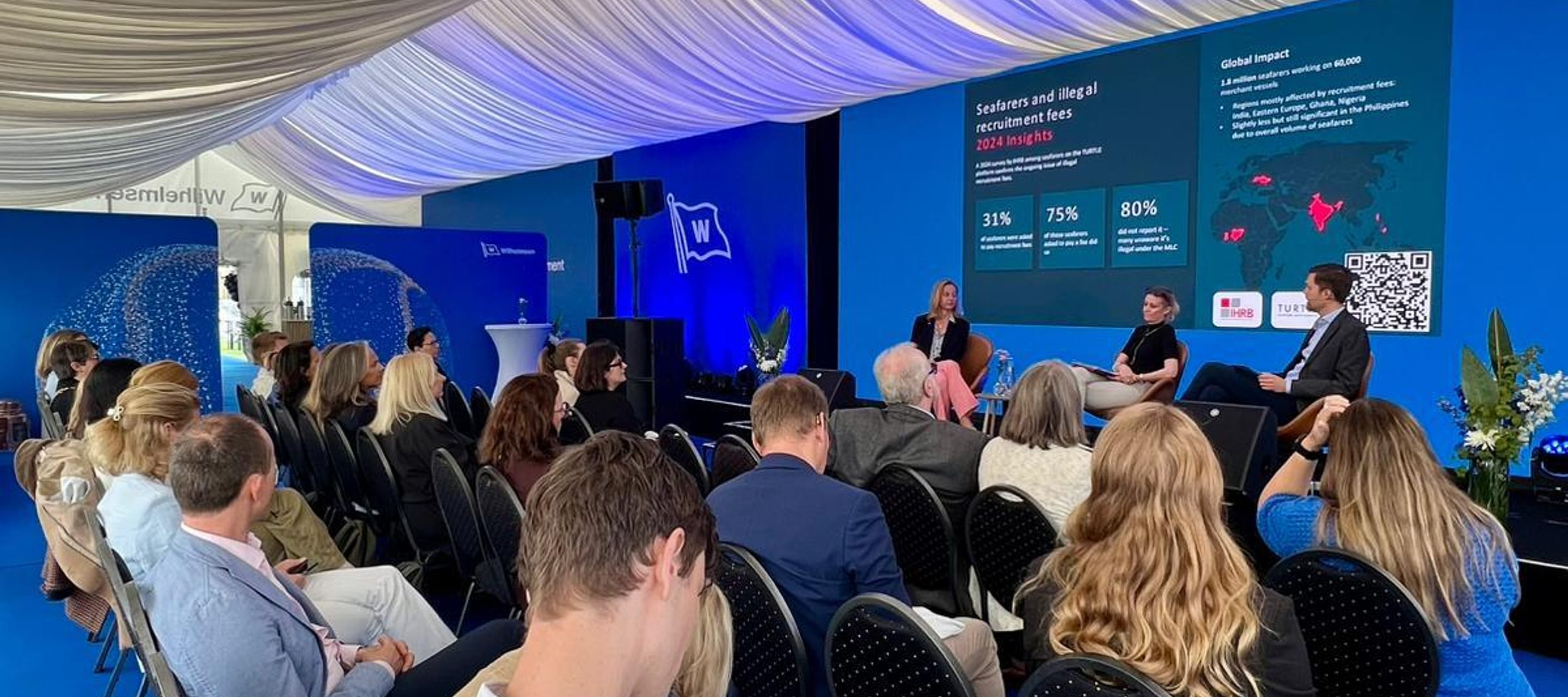Charting a Fairer Course: Advances in Seafarers’ Rights
10 June 2025

IHRB and Future-Proof – a collaboration platform between the Rafto Foundation and Bergen Chamber of Commerce - hosted a seminar: Charting a Fairer Course: Advances in Seafarers’ Rights and the Wilhelmsen Hub, in Oslo to coincide with the biennial Nor-Shipping conference.
The premise
Seafarers' rights have received increasing attention over the last five years and the shipping industry should be proud of its progress. However, there remain entrenched issues, and sticking points around human rights due diligence that need to be addressed. There is also scope to increase the role of finance in ensuring seafarer welfare.
The outcome will be actionable ideas for shipping industry representatives, as well as food for thought for further positive change. Specifically we tasked ourselves with the need to address these questions in two panels:
- What are the problems?
- What are the guardrails?
- Where are the gaps?
- What can we do?
Speakers included:
- Wiebke Schütt, Wilhelmsen Ship Management
- Alexander Held, TURTLE
- Francesca Fairbairn, IHRB
- Rachel Lock, DNV
- Sigrid Brynestad, Eksfin
- Andrew Stephens, Sustainable Shipping Initiative
- Jostein Hole Kobbeltvedt, Rafto Foundation
As an industry, we need to get better at demonstrating examples of what good and poor look like.
Rachel Lock
DNV
Seafarers' issues
The first panel concentrated on the first question - what issues seafarers are facing in 2025.
- Francesca outlined the range of issues, before Alexander focussed in on the issue of seafarer recruitment fees referring to the 2024 briefing published by TURTLE and IHRB on the topic.
- The 2024 results confirm that recruitment fees remain a huge issue in the industry, also negatively impacting the mental health of the affected seafarer, potentially leading to unsafe working conditions on board as a consequence.
- Jacqueline Smith of the International Transport Workers’ Federation (ITF) spoke from the floor on the devastating impact of these illegal fees on seafarers and their extended families. She also highlighted the issue of seafarers who raise complaints being blacklisted from future employment, which creates a very strong disincentive for seafarers to report issues, or even to refer to them when asked.
- The issue of the shadow fleet was raised and the implications for seafarers of working on board sanctioned vessels. Shadow fleet, recruitment fees, and abandonment of vessels are three interactive impacts. Jacqueline pointed out that some seafarers may not even be aware they are on board a sanctioned vessel, which creates further problems.
- To support affected seafarers it is essential that they know where they can go to report the charging of fees and to seek help. There are existing pathways: for example from ITF, Mission to Seafarers and ISWAN, but there is still room to for more resources, to make sure all affected have access and are informed.
- Wiebke stressed the importance of collaboration on industry level to spread the message and ensure the same information/education level for all stakeholders.
- Having well-informed seafarers and removing barriers such as recruitment fees will also help to get the right talents into the industry and expand the global seafarer pool in line with the increasing requirements for qualified crew.
Anyone interested in finding out more about the Action Group on Seafarer Recruitment fees should contact: francesca.fairbairn@ihrb.org.
Transparency and human rights compliance
The second panel addressed questions 2, 3, and 4, and particularly the issue of how shipping companies can show their customers that they are human rights compliant.
- Transparency can signal commitment but doesn’t have to mean perfection. Companies don’t need to aim for zero risk immediately, but rather seek to understand what is feasible given conflicting stakeholder demands, commercial needs, and what is within control.
- Most stakeholders don’t expect zero risk but they do want to be able to see and understand the approach to risk management.
- Being proactive rather than reactive can help prevent reputational damage in case of problems – it also helps companies to be intentional and plan accordingly.
- We shouldn’t underestimate the value of education and awareness (at all levels – from the seafarer to the boardroom) when it comes to these topics to ensure buy-in and "beyond compliance" approaches.
- As an industry, we need to get better at demonstrating examples of what good and poor look like, so we can learn and develop and improve. Case studies are essential to accelerate learning on success and failures, and for adoption – many stakeholders do not know where or how to start, and resist starting because of effort, cost and perceived risk of limited/no impact – learning the ‘how’ from others will remove much of this hesitation and deepen/ widen adoption and impact.
- There is clearly a need for consolidation – proliferation of many disparate initiatives is not helpful – so all industry stakeholders should strive for common goals, frameworks, interpretations and desired outcomes.
- Given the evidence for verification and assurance probity is at differing levels - a standard offering is much needed to create a basis for convergence towards a reliable and common set of outputs from a verification/assurance (audit) provision.
- Can we find a way for audits to be not only valid for a period of time (given its “snapshot” nature), but also available to other cargo owners/charterers?
- Educating seafarers on their labour and human rights (at least at Maritime Academies, Crew Training Programmes at ship management companies’ training centres), is essential (part of the Code of Conduct – see below) to help informed and confident choices to be made by seafarers.
Most stakeholders don’t expect zero risk but they do want to be able to see and understand the approach to risk management.
Rachel Lock
DNV



